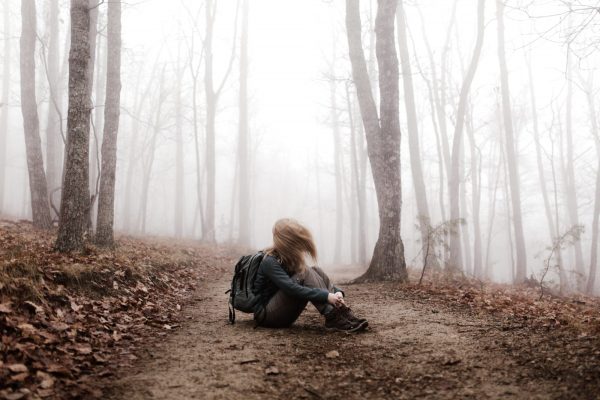 “I was 12 years old when my grandmother died. I tried to keep warm next to my mother, but she was cold. I went to my father, but his heart was made of stone. My brother was as dumbfounded as I was. Grandfather was dark from grief,” psychologist Ekaterina Sivanova writes about the loneliness she experienced. She suffered from it for almost 10 years. But it was this difficult experience that helped her understand her children as they became teenagers.
“I was 12 years old when my grandmother died. I tried to keep warm next to my mother, but she was cold. I went to my father, but his heart was made of stone. My brother was as dumbfounded as I was. Grandfather was dark from grief,” psychologist Ekaterina Sivanova writes about the loneliness she experienced. She suffered from it for almost 10 years. But it was this difficult experience that helped her understand her children as they became teenagers.

Ekaterina Sivanova
Hundreds of books and as many movies have been written and made on human loneliness. There is a person in deep thought, a sad expression on their face, rain dripping on glass or a sunset near water. This scene is certainly accompanied by a sad melody. Loneliness is unpleasant. Man is a social being. Stereotypes about this state of mind abound and shape our perception of loneliness as something that must be avoided, because it is fraught with danger.
What’s on the mind of a person who spends evenings alone? What is concealed in the look of someone who is listening to his favorite music alone? This is all incomprehensible and requires urgent changes. Sound familiar? Yes.
So if we are so worried about the loneliness of adults, we, parents, do not expect anything good from a teenager’s desire to be alone in principle.
Today we are talking about the loneliness of a teenager and how to survive next to your child, who suddenly started to love being alone.
The Girl on the Train
As a mother, I have read many books about parenting and many articles by my fellow psychologists. All of them deserve attention and gratitude from us, parents, who are desperate to find answers to our questions. But still, my best advisor and helper is myself, my experience, and my loneliness in adolescence.
I remember myself at that age perfectly. The age that parents of future teenagers await in awe. In my childhood, adults did not treat the behavior of their children in any special way. It’s just that everyone, without exception, was busy with surviving.
I turned 12 in a provincial town in 1986, and a month before that I alone crossed the Russian border on the Prague-Moscow train and in a place called Chop changed my parental savings from crowns to rubles (my father served in the Czech Republic, we lived with him ). Nobody got worried, there were no telephones. It was what the family needed, merely circumstances. I was not afraid to be alone on a train with strangers, to communicate with border guards and to walk during a three-hour stop in a border town in search of an exchange office.
My youngest son will turn 12 years old in a few months. I can hardly imagine in what circumstances I would be able to organize such an “adventure” for him.
Were my parents irresponsible? No. Didn’t they love or care about me? It’s not the case. I just grew up at different times.
But loneliness … I constantly felt like an insanely lonely person. Moreover, this state gradually filled me and remained with me until the moment when I met my husband (at the age of 25).
Today, having been a wife for 22 years and a mother of three, I rather dream of being alone. Loneliness in the sense of a state of mind does not threaten me, because I have done a lot and do for this every day of my life.
“Mom, I need you!”
But at my 12, I discovered my loneliness in the fact that I suddenly turned out to be of no use to anyone with my ridiculous thoughts and experiences.
My mother’s mother died suddenly. The family was shocked. She got up in the morning, fell down and that’s it. The life of five people stopped, it turned upside down. Nobody expected it. No one was ready, and my “significant adults” were confused. My parents made spontaneous decisions that were wrong (it was their assessment, not mine) and which greatly influenced our future life.
Yes, those few years are now my richest experience, I rely on it and it helps me a lot. But then, when I was twelve, I was increasingly lonely.
I remember this piercing feeling. It’s as if a hole formed in the middle of my chest and a cold, thorny wind whistled through it.
I tried to keep warm next to my mother, but she was cold. I went to my father, but his heart was made of stone. My brother was as dumbfounded as I was. Grandfather was dark from grief.
I could not find friends in the new city, because before that I had lived for five years in a closed garrison in Europe, where there had been an oasis of communism (at least so it seemed to me) and the relationship between the children was like in a movie about a happy childhood. A Soviet northern city of 1986, greeted me with gloomy glances from passers-by and swear words spoken by my classmates.
I remember how a girl at school explained to me who was friends with whom and said: “This girl dates this guy”, but it was all so strange to me.
I didn’t know elementary things, for the first time I heard a speech, consisting mainly of bad words. My naivety and confusion became the reason my classmates started to ridicule me and my life became similar to the script for the movie “Scarecrow” (by the way, when I watched this movie, I sincerely did not understand why everyone was in such a shock. It was worse for me).
My loneliness deafened me. In the blink of an eye, no one needed me. All doors were tightly closed. I hung out in city buses, I walked long paths on the way home from the music school, I sat in the porches and thought about how to quickly end this hellish existence, because I was sure: it will always be this way.
I am trying to remember at least one bright spot, at least one good person who would understand the full extent of my despair.
Chocolate sweets from the Baltic factory Kalev. That’s it. There was definitely no person. I ate candies in boxes. There were a lot of them, my parents bought them at a store that my grandfather could use. A box was in the fridge, I just hung there until I ate everything. Then I was very scared that I alone ate a whole box of chocolates, but no one ever told me anything, a full boxes appeared again, and again.
I had a dog! The dog who lived for ten years with my grandmother, and after her death, from all the remaining family members, chose me. Bim and I walked along the evening streets, rustled with leaves, trampled snow, jumped over puddles. That’s who my real friend was at the time. But a person needs another person. And I didn’t have one. But there was a diary.
Now, rereading these pages, I understand that this girl desperately wanted her mother to know how bad she felt. It wasn’t hidden between the lines. In large letters she wrote: “MOM! I NEED YOU!”
Nobody heard this cry. Unfortunately.
I grieved too, but we were together
And I learned to live in my loneliness. I had to. Several times I wanted to die. Every time, one minute before ‘the act’, the expression on my mother’s face would come up in front of me at the moment when she would learn that her daughter was no longer there. I couldn’t hurt her that much.
And then, naturally, I had a awkward first love. In the eleventh grade I was going to get married. After the second year at college, I did get married. Although, I married a different person and our marriage did not last long. I hadn’t managed to get rid of my feeling of loneliness.
Now it seems to me that this feeling left me when I met the father of my children. But this is not the case. A lot of time passed, my children were born, but I still could not believe that I could relax and be together with someone.
Adolescence cost me a lot. Although my parents did not notice this period…
It is these memories of a twelve-year-old me with a box of chocolate sweets, that is my bridge to the hearts of all my three children.
The adolescence of my eldest came at a time when my mother passed away (this happens in many families: adolescence of children, midlife crisis of parents, illness and aging of the older generation, sometimes all three periods occur at the same time). I grieved. But I knew they grieved no less. And so we were together.
Although, in fairness, I will say that both my son and my daughter are still discussing this loss with their psychologists. But I still did a lot: my children always knew that even in tears I was ready to hug and accept them.
It is impossible to be a constantly giving and understanding mother. But being close – perhaps, sharing your thoughts and accepting your child’s – is possible. You just need to remember your young self who was lonely and not lose touch with yourself (psychologists call this “staying in contact with yourself”).
I know people who do not remember their childhood. And I know those who have not been touched by all this “teenage suffering”. What should they do? What should they rely on when trying to comprehend the despair in their child’s eyes?
As always, start with yourself. Arrange your meeting with yourself when you were twelve or thirteen years old. Ask yourself a question: what do you want now? How are you now? How can I help you?
How to support a teenager if he / she is lonely?
Modern psychologists say that the loneliness of adolescents is associated with their low self-esteem, undeveloped communication and organizational skills, stress, and emotional background in the family. The higher the feeling of loneliness in a teenager, the more he becomes withdrawn, insecure, shy, the more he secludes himself and does not allow others to approach him.
How to get close to him? How to talk? How to make it clear that “he has you”?
Be there and wait. Walking past the room, say: “I’m in the kitchen, drinking tea. Ready to hug and talk. If you want to, come. I’m waiting”. Of course, you can’t go into a teenager’s room and try to hug, touch, talk. No. It is important to communicate that you are there. One day he will come out of his shell and say: “Mom, what do we have for tea?” Although, their voice will already be quite mature…
Well, at the end of this difficult conversation, I want to share with you these little notes from my children about their feelings of loneliness.
Ivan, 11 years old:
“Loneliness is necessary for a person, like a rest from the world around him, and therefore I believe that loneliness is sometimes even necessary for a person, but not too much.
Parents don’t have to worry about the person wanting to be alone. But if the child does not leave their room for a long time and does not want to talk to anyone, then this is a wake-up call for their parents.
I don’t feel lonely at all. This is probably because I have a family, a football team and friends.”
Maria, 18 years old:
“I think that it is important for any person, especially in adolescence, to be alone sometimes. Well, okay, I will not speak for everyone – even as a teenager, and now it has been important to be alone for me, because only alone I can put all my thoughts on the shelves and organize them, and I consider the observance of the right to loneliness to be the most important principle of personal boundaries.
Certainly, parents may be worried that their child is constantly sitting in his room and not communicating with anyone. However, it seems to me that this problem has a very simple solution – to talk, discuss whether the child is comfortable or something happened. If from the very beginning your communication was built correctly, then it will not be difficult.”
Georgy, 21 years old:
“It is important to have the right to be alone. It is in this state that a person can get to know himself, communicate, and understand something important. And if the child is comfortable with himself, this is very good and important. The parents may sometimes ask the question: “Are you all right?” And if the answer is yes, then nothing needs to be done.”
Translated by pravmir.com

















